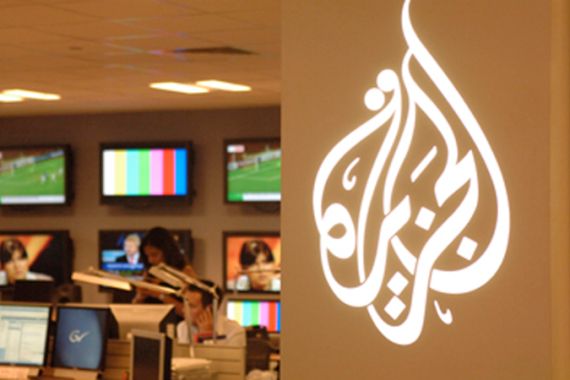Danish party urges Arab TV ban
People’s Party says Al Jazeera and other Arabic channels sow hatred against Western society in immigrant communities.

 |
|
The government has relied on Kjærsgaard’s party for the majority since 2001 when they came into power [EPA] |
Pia Kjærsgaard, leader of the far-right Danish People’s Party, is calling for a ban on satellite antennas in residential areas with large immigrant populations in Denmark.
She has since pushed for the national broadcasting authority to prevent Al Jazeera and other Arab satellite channels from broadcasting in Denmark.
Keep reading
list of 4 itemsInside the pressures facing Quebec’s billion-dollar maple syrup industry
‘Accepted in both [worlds]’: Indonesia’s Chinese Muslims prepare for Eid
Photos: Mexico, US, Canada mesmerised by rare total solar eclipse
Kjærsgaard accuses them of “broadcasting indoctrination from the Middle Eastern world”, and “inoculating the viewers in Denmark to hate Denmark and the West”.
The controversial proposal has so far been met with criticism from the Danish People’s Party’s coalition partners, the liberal and conservative parties.
Although both main parties disagree with the proposed ban, they fundamentally agree with the People’s Party’s claims – as a spokesman for the conservatives put it – that Arab channels “espouse anti-Jewish and anti-Western propaganda”.
But banning Arab channels will give the impression that Denmark is suppressing Arab points of view, the spokesman said.
The current government has relied on Kjærsgaard and the People’s Party for its majority since 2001, when the coalition came to power following campaign laced with anti-immigration rhetoric.
The ruling party’s Kristian Jensen says Denmark should defend freedom of speech, but cautions that there is an opportunity to make a case to the country’s broadcasting authority if the channels break the law.
Conflicting opinions
Kjærsgaard says that the broadcasting authority can move to ban a channel it sees as promoting hatred.
Meanwhile, opposition parties are outraged, describing the People’s Party’s proposal as a “desperate” attempt to maintain its grip on the debate on Muslims and immigrants in Denmark.
The main opposition party, the Social Democrats, thinks that it is “un-Danish” to forbid people from deciding which TV channels they can access.
“We live in Denmark, not in North Korea or China,” the party has said.
| In depth |
|
|
Al Jazeera broadcast a documentary in 2009 entitled Confrontation in Copenhagen, which dealt with the racialised debate on crime in Denmark as well as the new anti-immigrant laws, sparking a huge debate in the country.
Calls to strip me, the producer of the piece, of my citizenship were heard on the fringes.
In the lead-up to the film’s screening, headlines such “A Palestinian-Dane produces a dark film that portrays Denmark as a racist country” filled the screens and front pages of many Danish media outlets.
The main two television broadcasters, TV2 and Danish Broadcast Co-operation, as well as all major national news papers, treated the film as second “cartoon crises in making”, referring to the controversy stirred when the Danish newspaper Jyllands-Posten published cartoons of the Prophet Muhammad in 2005.
In the hours before the documentary’s screening, there was a heightened state of alert across Danish embassies in the Arab and Muslim world. As Al Jazeera went on air with the film, Denmark’s main TV channel picked up the telecast live.
Nasser Khader and Fathi al-Abded, two Danish politicians and representatives of the communities, concluded that the film would harm Danish national interests, especially if the “imams” made use of it.
Sober evaluation
The verdict of independent media experts and the Danish ministry of foreign affairs was considerably less alarmist. They judged the film “innocent”, “critical”, “fair and balanced”.
The next day the Danish press reported that no embassy representatives across the Arab and Muslim world had reported any attacks or threats against Danish embassies. The story died down.
Nonetheless, the initial panic was reflective of how the Danish People’s Party, major media outlets and the government have been dealing with any critique of Denmark’s treatment of its Muslim minorities.
However, unlike during the cartoon crisis, the shoe was on the other foot this time around. It was Denmark that was under the spotlight. It was Denmark that was reacting, not so-called outsiders, as we saw during the cartoon crisis.
Al Jazeera is not responsible for the contents of external websites
 Copenhagen’s ‘racial’ gang wars
Copenhagen’s ‘racial’ gang wars